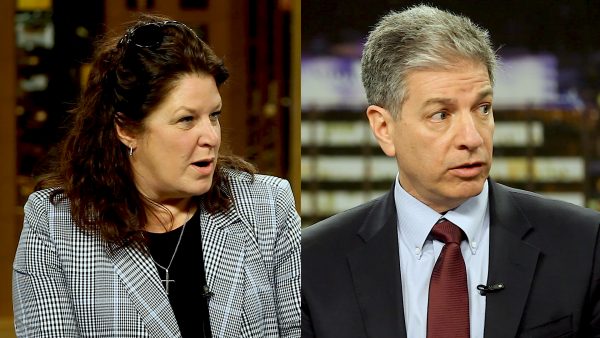
As Anchorage cunducts its first-ever election through mail-in ballots, residents are being asked to vote on a long-list of measures — including a controversial bathroom ordinance, the complex sale of a utility, as well as several bond and tax proposals.
And at the top of all that is the choice for the city’s next mayor. While the two major candidates are focused on the same central issues, they have divergent stances.
Though there are technically nine people who have filed paperwork to run for mayor, only two have raised significant sums of money and mounted visible campaigns: Incumbent Ethan Berkowitz and challenger Rebecca Logan, both of whom recently appeared on Alaska Public Media’s television program Alaska Insight.
Both Berkowitz and Logan have framed crime and the economy as the campaign’s main issues. Berkowitz is casting a potential second term as a continuance of policies he’s pursued the last three years. In her campaign, Logan has differentiated herself by running further to the right, offering a more hard-line vision for policing, including tougher treatment of lower-level crimes like petty theft, shop-lifting and vandalism.
“That’s what’s seeming to cause, I think, the most fear with people, because that’s what an Anchorage citizen on a daily basis is subject to,” Logan said, referring to property crimes. “So you have to have a zero tolerance policy there. Meaning arresting those people and keeping them in jail.”
Berkowitz has made expansion of the Anchorage Police Department a central policy of his tenure, and he says the administration’s recruitment targets are one piece of a long-term strategy.
“Are we getting as far as we need to go as quickly as we can? No,” Berkowitz said of the city’s progress handling several years of rising crime. “But there’s also a recognition this is not just a law enforcement problem.”
Berkowitz points to a multitude of public safety factors all at play in the city’s struggle with crime: Diminished state resources, the impacts to local departments from the criminal justice overhaul in Senate Bill 91 and the opioid epidemic. He believes the city’s approach to substance abuse needs to include expanded treatment options by collaborating with private and non-profit partners.
Logan disagrees. In one of their biggest policy differences, she does not support expanding drug treatment, saying the majority of people addicted to opioids are engaged in criminal activity, and thinks rehabilitation should be part of incarceration.
“What’s happening is people get arrested for committing a crime, they’ve got a drug problem, and there’s never a break in the cycle because they’re getting out on bail. They aren’t even spending any time in prison,” Logan said. “I think that people need to have rehabilitation and treatment as part of a sentence, and that it’s mandatory.”
On the local economy, Logan believes the administration’s policies should emphasize businesses that are currently in Anchorage without over-taxing or over-regulating them. In a question on municipal finances Logan criticized the size of the current administration’s budget, but offered no specific programming cuts or alternative revenue models.
“We’ve got to be really careful about our spending level and making sure we keep that under control so that we don’t go straight to the property-tax payers looking for taxes,” Logan said.
Berkowitz defended his administration’s work to shore up city finances as state funds have retreated the last few years.
“Our focus has been on finding new revenue sources, which includes things like diversifying the income stream, reducing the tax-burden on property-tax owners,” Berkowitz said. “We’re also looking for ways to raise revenues from enterprises. That includes the sale of ML&P to Chugach.”
A question over that utility sale is on the ballot and needs voter approval before a final deal can be negotiated and finalized.
Though the mayor’s race in Anchorage is technically non-partisan, the two candidates’ fundraising disclosures are filled with familiar players in the state’s party politics.
In the latest round of filings, Berkowitz, a former democratic state representative, had raised $221,001, more than twice the $88,973 Logan brought in. Among his donors are several Political Action Committees for organized labor and public safety unions, several current and former Assembly members, many state and municipal employees, as well as prominent individuals aligned with the state’s Democratic party. Almost half of that money has been spent down in just the last month, much of it on media buys, ad placement and polling.
Logan is the CEO of an oil and gas industry support group. Her donors include many individuals from the resource development sector, prominent conservative activists, Republican groups, as well as former Anchorage mayor Dan Sullivan. As of Tuesday March 27, her campaign had just $3,296 left on hand, with a week left before the election ends — a final stretch when many campaigns spend aggressively to get their message before voters.
Both candidates expressed general support for the city’s inaugural election conducted by mail-in ballots, though Berkowitz noted nobody is quite sure what it will do to voter turn-out and demographics.
“I didn’t anticipate being part of the guinea-pig election,” Berkowitz chuckled.
“Yeah, I didn’t either,” Logan added.
Both candidates say they will vote against Proposition One, the proposal to modify the city’s existing laws in order to regulate public bathrooms and changing facilities according to biological sex at birth rather than a person’s self-identified gender.
The last day to cast ballots is April 3rd.
More information on the ballot measures, candidates, and vote-by-mail system can be found on the Municipality’s elections website.
Zachariah Hughes reports on city & state politics, arts & culture, drugs, and military affairs in Anchorage and South Central Alaska.
@ZachHughesAK About Zachariah




